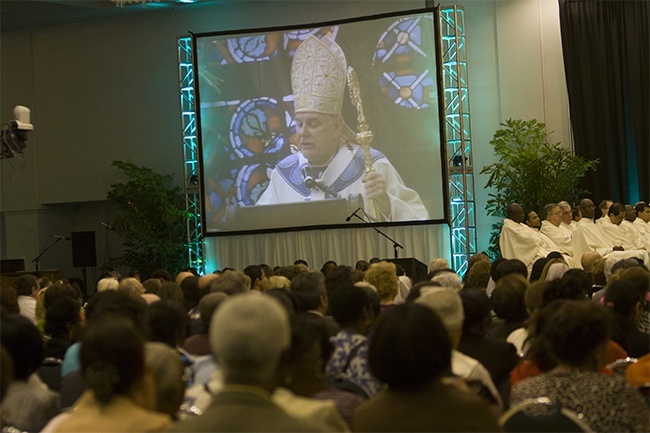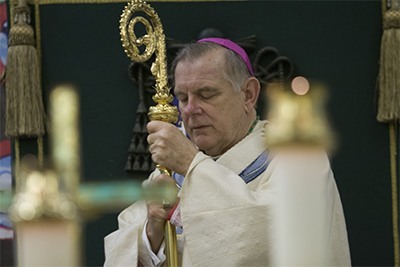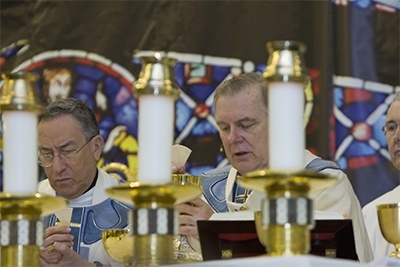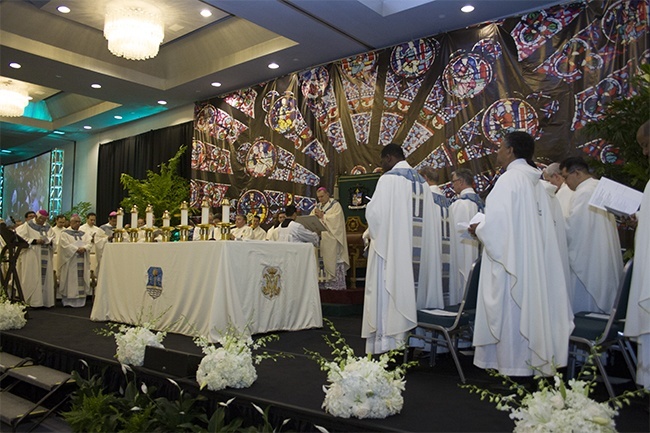By Archbishop Thomas Wenski - The Archdiocese of Miami

Photographer: ANA RODRIGUEZ-SOTO | FC
Archbishop Thomas Wenski's image is projected onto one of two large screens during the Synod closing Mass, which was broadcast live by EWTN and livestreamed on the websites of the Archdiocese of Miami and Radio Paz 830 AM.
This Scripture verse has been called the �Great Commission� � and with these words, Jesus has given us what should be our strategic plan. We are called to be �faithful disciples and missionaries of hope.� The Church exists for no other reason but to evangelize.
So, you might want to ask, if �Go make disciples of all nations� is our strategic plan, then why did we need a Synod? The purpose of our Synod here in Miami was simply to examine what we must do as a community of faith to put into action, as Blessed John Paul II said in Novo Millenio Ineunte, "the plan found in the Gospel and the living tradition to make Christ known, loved and imitated so that in Him we may live the life of the Trinity and with Him transform history until its fulfillment in the heavenly Jerusalem."
The hoped for fruit of our Synod � through the implementations of its many recommendations - is to help all of us, priests, deacons, religious and members of Christ�s faithful, to become more faithful disciples and thus missionaries of hope � of a hope that, because it is centered in Christ, will not disappoint.

Photographer: ANA RODRIGUEZ-SOTO | FC
Archbishop Thomas Wenski listens to the Gospel during the Synod closing Mass.

Photographer: ANA RODRIGUEZ-SOTO | FC
Archbishop Thomas Wenski consecrates the Eucharist with Honduran Cardinal Oscar Rodriguez Maradiaga at his side.
Our plans for the next several years will provide every one of us with opportunities to do that and much more. We will develop and share faith formation programs for all ages of disciples so that we can be more credible, confident witnesses of our faith. We will strengthen our sharing of the Gospel message better through our coordination of service and outreach activities. And as Catholic adults, we know that our most important missionary service is to the adults of tomorrow, the Catholics of today most in need of our authentic witness - our youth.
In the midst of all the activities and programs we initiate, we must never lose sight of the fact that ultimately we are seeking to share God�s love, which requires our love. Yes, it requires your time, it requires your talents, and, of course, it may require your treasure, especially when your Archbishop asks. But it always requires your love.
As Pope Francis has shown, the door to a person�s soul is the heart. Thus, the only expression of the Church that will convince a doubting and skeptical world is our love, a love that convinces the world only in the measure that it reflects and embodies the self-sacrificial, unconditional love of Jesus Christ
As Teresa of Avila said, �Christ has no body now but yours.� Today, it is through our eyes that Christ looks with compassion on this world, it with our feet that he walks to do good, with our hands that he blesses the entire world.
As we go forth to implement this pastoral plan, the plan in which we take up for this time and this place the challenge of the Great Commission to �go and make disciples of all nations,� we must remind ourselves that ultimately this is not my plan � I am not foolish to think this or to think that I can do it by myself. It is our plan � and it is a product of much consultation and much collaboration and it will only be implemented if we continue walking together � and working together. But, more importantly, we must remember that just as we are the Church, but the Church is not ours but the Lord�s, so too, this is more than our plan it is his plan � and as he assures us in the Gospel reading today, he is with us always, �until the end of the age.�
And so as we move forward, we keep in mind the words of the Pope emeritus, Benedict XVI, who wrote in Deus Caritas Est: �In all humility we will do what we can, and in all humility we will entrust the rest to the Lord. It is God who governs the world, not we. We offer him our service only to the extent that we can, and for as long as he grants us the strength. To do all we can with what strength we have, however, is the task which keeps the good servant of Jesus Christ always at work: �The love of Christ urges us on.�� (2 Cor 5: 14). #35 Deus Caritas Est.

Photographer: ANA RODRIGUEZ-SOTO | FC
View of the altar during the Synod closing Mass.


Comments from readers